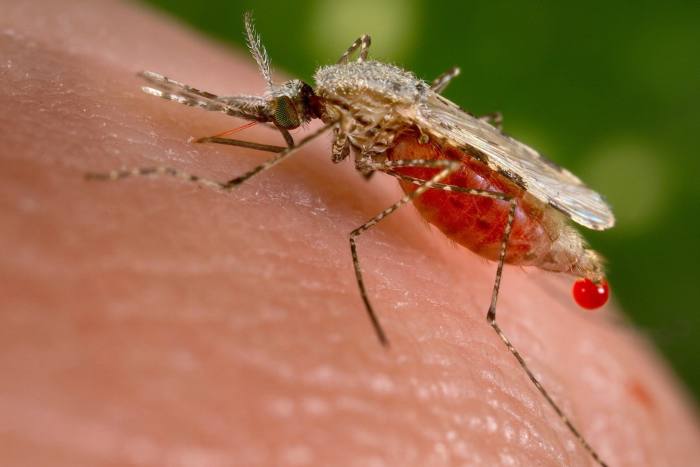Bacteria in mosquito guts trialled as weapon against malaria
Scientists are developing a promising new weapon in the fight against malaria in the form of bacteria found in the guts of mosquitoes, which limit the growth of the microscopic parasites that cause the disease.
The TC1 strain of Delftia tsuruhatensis, a naturally occurring bacterium, was discovered accidentally at the Spanish laboratories of GSK, the pharmaceutical and biotechnology company, in the course of its work looking into a disease that kills more than 600,000 a year.
Thomas Breuer, chief global health officer at GSK, hailed an “entirely novel approach for malaria control”. He continued: “TC1 has potential to further reduce the huge burden of malaria in endemic countries and is more evidence that through deploying a range of prevention approaches, we may be able to finally eradicate this terrible disease.”
Nearly half the world’s population is at risk from malaria. The Anopheles mosquito, which spreads the Plasmodium parasite responsible for malaria, is currently tackled with insecticidal nets, indoor sprays and antimalarial drugs. But the effectiveness of these methods is declining as mosquitoes and parasites become resistant to chemical treatments.

Field tests in Burkina Faso’s Institut de Recherche en Sciences de la Santé (IRSS) and further research in collaboration with Johns Hopkins University in the US and other international partners suggested that TC1 could be developed into a safe and effective way to control malaria. Results were published in the journal Science.
Janneth Rodrigues, project leader at GSK’s Tres Cantos lab, said experiments showed that mosquitoes infected with the bacteria were no longer carrying the parasite at any stages of their life cycle.
When the scientists introduced TC1 into mosquito colonies in controlled settings, the insects were not harmed by the infection. The study showed that the bacterium was not transmitted to humans when the mosquito fed on their blood.
Delftia tsuruhatensis bacteria are routinely found in natural environments. Although the species has been shown to cause rare cases of disease in immunocompromised individuals, the researchers do not expect this to be a serious safety concern.
They found that TC1 produced a small molecule called harmane that inhibited parasitic development. Harmane is a neurotoxin in high doses but is considered safe in the tiny quantities produced by the bacterium in mosquitoes.
“Harmane can be found in most foods, coffee and barbecued meats and is naturally produced within the human body,” said Rodrigues.
Further confidence comes from the safety record of Delftia-based products already marketed as plant growth promoters in agriculture.
Mathematical modelling at Imperial College London forecast that use of TC1 over three years would reduce clinical cases of malaria by 15 per cent, not only saving lives but reducing hospital admissions and freeing healthcare resources to tackle other potentially fatal diseases.
Rodrigues said future research and development would help GSK and its public health partners decide how to deploy TC1 in malaria control. It might be possible to use live bacteria, a cell-free extract containing harmane or purified harmane in different circumstances.
“The successful implementation of this biocontrol tool could have a profound impact on public health, ultimately helping to save the lives of millions of children and fostering sustainable development in malaria endemic regions,” said Abdoulaye Diabaté, director of medical entomology and parasitology at the IRSS in Burkina Faso.
This story originally appeared on: Financial Times - Author:Clive Cookson




























